I recently bought a vehicle that has FlexFuel capability and can use E85 (mostly ethanol) fuel. But can you guess whether it is more economical for me to use E85, or regular gasoline? Read the SAS analysis below to see if you guessed right!
I've been the happy owner of a 1995 Jeep Cherokee for 21 years. I used it to haul DJ gear, pull trailers, and transport kayaks & canoes on top. It never left me stranded, and has been my favorite vehicle.
But, as my hobbies have grown, so have my vehicle needs. The Cherokee just won't hold all the DJ gear I want to take when I play music for a car show. And I don't think it could safely tow my 30-ft boat. And although it's never broken down, it's getting too old for me to trust with a high degree of certainty on a long trip. So I studied the used car market for several weeks, and decided that a Chevrolet Suburban would be the perfect special-purpose vehicle (to go along with my Prius daily driver). So I got a 2007 Suburban LS 4wd, with the 5.3 liter v8 engine - it's got twice the space & twice the horsepower of my Cherokee, and is 1/2 the age!
The Suburban is FlexFuel capable (meaning it can use E85 fuel), and the previous owner mentioned that he had recently filled it up with E85, since it cost less than $1.50/gallon (about 30 or 40 cents cheaper than regular gasoline). But I wondered if it was really a better deal, since you get fewer miles per gallon with E85. So of course I decided to analyze this question using SAS software ...
The Analysis
First, I needed to collect a bit of data. I went to the fueleconomy.gov website and looked up the mpg for my Suburban using regular gasoline and E85 (16 & 12 mpg). I used gasbuddy.com to find the price of regular gasoline near me in the 27513 zip code area ($1.84/gallon at the Shell station nearby). Gasbuddy doesn't track E85 fuel prices, so I went to the government's alternative fuels database center, and found the closest station selling E85 (which was a Sheetz station in Raleigh). The database didn't list prices, so I called the Sheetz station, and the manager was kind enough to go outside and check today's price for me - $1.49/gallon.
Now let's analyze the data. First I plotted the fuel prices. I don't usually get 'cute' with my graphs, but I decided to fill the E85 bar with a corn-kernel image, so you can easily tell which bar represents the corn/ethanol fuel. We knew that E85 was cheaper than regular gasoline based on the price numbers, but the graph helps your brain visually compare them on more of a percentage basis.
Next I plotted the miles per gallon. We knew that 16 was more than 12, but the graph helps us see "how much more."
And finally, I calculated the cost to drive a mile (by dividing the two numbers in a data step), and plotted results. This shows that it is about 1 penny per mile cheaper to use regular gasoline instead of E85. Therefore, based on end-user cost alone, I think I'll just use regular gasoline. :-)
Does E85 fuel save you money or cost more? #analytics Share on XHopefully you've enjoyed this simple analysis, and perhaps learned a few new SAS tricks. Feel free to download the code to see how you can create similar graphs. While you're going through the code, I invite you to watch the Beverly Hillbillies episode where Granny uses her moonshine (ethanol) in the old truck, to beat Jethro's hotrod.Now it's your turn - what other analyses would you recommend performing to more fully compare E85 to regular gasoline, to find out the "true price" and the global impact, etc?
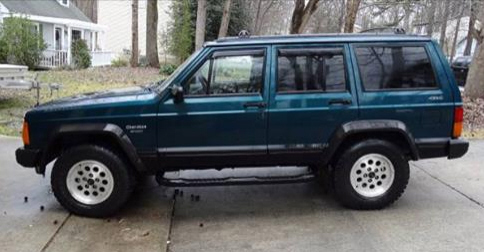
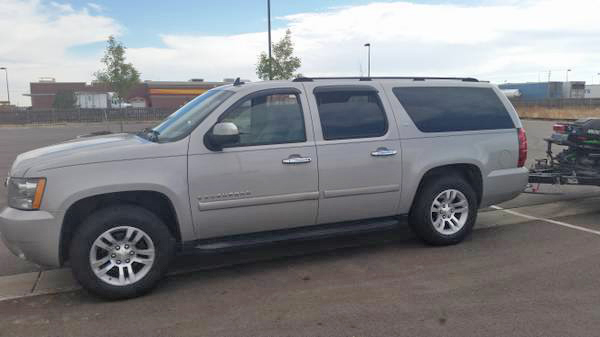
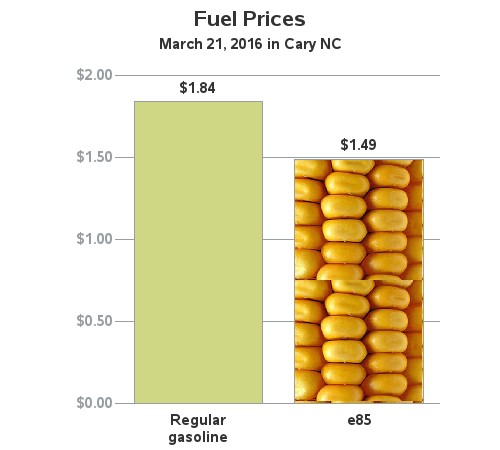
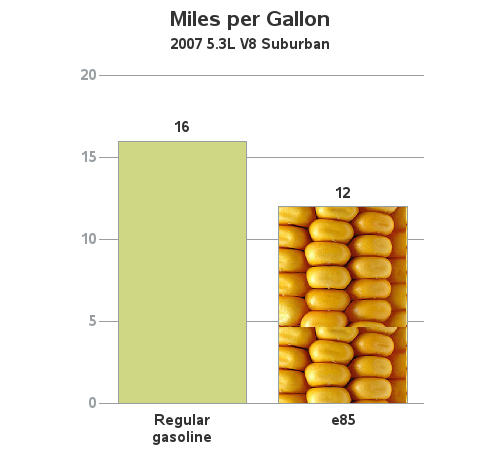
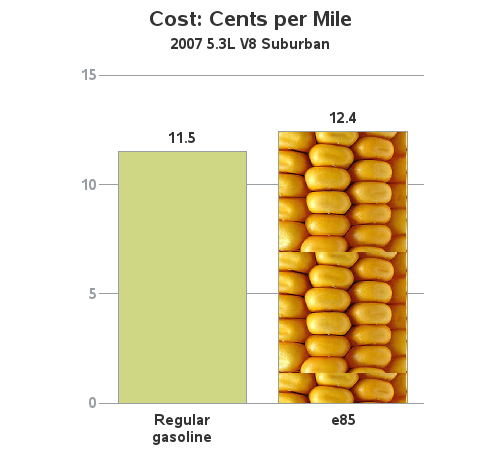



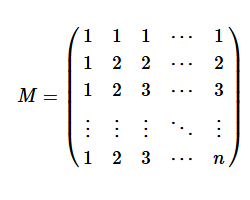



28 Comments
We need to do better. Call me crazy, but I like to breath clean air, and I like my engines to run good. We need to mandate E-85 as an "option" for customers at every gas station in America (along side regular gasoline), and then Auto Manufacturers need to start selling engines that are BUILT for E85 (High Compression, Direct Injection) along side their standard gasoline engines, so that we can easily use the benefits of E85 (45-55MPG, with more HP) and clean up our air. There is no excuse anymore, its all about greed. As much as I don't like Government Intervention in most cases, I also am not blind to the fact that when greed is a factor, the greedy will eliminate your choice to deviate from their profits, all the way to your grave (or in this case, your oxygen chamber). I want choice.
I have a 15 suburban 5.3, i see 20 mpg on hwy e85 and around 13 14 in the city. Saw similar mog in my 14 5.3 silverado. My 15 6.0 2500 doesnt fare so well, 14 hwy and 8 city. All on e85. I am now trying blending of e85 and 87 (5 gallons) e85 is 1.55 and 87 is 2.69 in ny
Gasbuddy does track E85 fuel prices now.
Cool - thanks for the heads-up!
Ethanol is better than gasoline in every way. I have been using it for fuel in small engines modifed for ethanol over 10 years. Gasoline is industrial garbage.
When you burn gasoline you are releasing carbon dioxide, carbon monoxide, unburned hydrocarbons aka a fine mist of gasoline and nitrous oxides and particulate emissions just to name a few of the nasty emissions.
When you blend ethanol into the industrial garbage we call gasoline.. you reduce the amount of co2 released, co, misted gasoline which is a toxic stew of cancer causing chemicals including benzene tulene etc , nitrous oxides which form smog pollution and "particulate emissions"(a fancy way of saying black carbon soot that is a bane for public health and gets lodged deep in the lungs causing more cancer.....
When ethanol is made from corn it produces dozens of products. Ethanol is a product of corn processing... It's not food we burn. We get more food. dried distillers grains with soluables is high value animal feed. you also get corn oil, food grade co2 that can be captured or used for the billion dollar co2 market, corn meal, high fructose corn syrup, corn starch, etc etc etc.
Because ethanol is a high octane fuel when we blend it with the low grade industrial garbage coming out of those fracking wells it means that the overall supply of usuable gasoline is increased and the price is lower than it otherwise would be.
Measuring ethanols energy content by the amount of btu is terrible way to measure... Because ethanol has a higher latent heat of vaporization than gasoline. Some of it's heating energy is lost as the fuel changes from liquid to a vapor..... When this happens in your engine that latent heat transfers to the intake charge cooling the incoming air making it denser. More fuel and more air equals more power.
Because it's a high octane fuel it can be compressed more without misfiring. this means that you get more usable energy than an equal amount of gasoline.
Because it's oxygenated it burns more completely.
It will keep your engine clean. Less soot to clog up well everything. I'm at 224,000 miles on a 06 Pontiac vibe I run e30 in. Sounds like it did at 80k. I expect the frame to fall apart long before the engine does.
In conclusion e85 is about american as apple pie and if you keep buying gasoline you are a filthy globalist traitor. Ethanol is superior in every way. We need to build the engines of the future that will take advantage of this and other wonderful biofuels. Bio butanol is an excellent example of a next generation bio based fuel that could replace gasoline today. It's 97% energy content of gasoline and has a 100 octane rating. Unlike ethanol it is as non corrosive as gasoline. It could be replacing 100% of all gasoline usage with no modifications required for all cars and small engines.
The cost of gasoline is much higher than what you pay at the pump. The price is our democratic republic and the oil monopoly could well give a damn about that.
Oil is a 19th century solution to a 21st century problem. It will inevitably fall to the rising demands for energy and falling costs of renewable generation and storage of energy.
Interesting information!
Ford was able to come up with a dual fuel engine that uses e85 in 1to5 ratio to boost overall efficeny and mpg. This PDF is great read.
Ethanol Optimized Engine - USDA ARS
https://www.google.com/url?sa=t&source=web&rct=j&url=https://www.ars.usda.gov/ARSUserFiles/np213/Teleseminars/Robert%2520Stein%2520(AVL)%25203-29-11.pdf&ved=0ahUKEwixiPOXj6bWAhVDMSYKHWOeCCsQFghbMAs&usg=AFQjCNGd2gxeaD7ssbcY6W_jiqKQkEtyYA
Coming from someone in the "Ethanol Business". It's easy to see why you are so bias. Not saying it isn't true but it's telling in your tone................"if you keep buying gasoline you are a filthy globalist traitor."
Like your specific info. We should design society to use less energy in general.
Many of the miles my GMC 1500 5.3 are short trips, 40 minutes or less with numerous stop and starts. I don't really keep track of the fuel/mileage for mpg, but I do notice how often I fill and that doesn't vary regardless of which fuel, so I'm very happy to save the 60 cents a gallon at my local Cenex co-op.
Hmmm, very interesting information..... I just bought a 2012 Cadillac SRX and it takes the e85, I couldn't find e85 anywhere the first 2 days of having it, so running it on regular gas I was getting 19 MPG, I finally found one gas station that sells it in my area (about a half hour away), now I always use it, but my MPG hasn't changed at all, it is still 19. So I was thinking it was alot better to use it. Do you think your MPG difference is because you have a massive truck? Are any other readers with smaller SUVs like mine getting a difference?
Thanks for all your information, very interesting.
I found article that claims you can boost your power, at least in my truck, with E85, i.e. raise the horse power from 360 to 375. That might seem like a lot, but it can help if you are pulling a travel trailer and you are at your weight limit so to speak. What do you think?
http://news.pickuptrucks.com/2010/09/2011-ford-f-150-50-liter-v-8-gains-power-burning-e85-ethanol.html
One concern - when you raise the horsepower of the engine, are the other components (such as transmission, trailer hitch, etc) able to withstand the extra power.
When running e85 you should get 10% better torque and lower the engine running temperatures. It cools the intake charge as it vaporizises. At a given rpm level you will have more horsepower and more torque compared to gasoline. Some people claim ethanol burns hotter. This is a false claim. If you burn ethanol without increasing the flow rate of fuel that would be true as it would result in a lean burn. If it's too lean it burns hot and runs choppy and revs higher. All flex fuel cars and trucks are designed to run richer on e85. That results in lower engine temperatures and less wasted energy. Heat robs power. 10% extra power is not much more than all other components are designed for and you can bet the auto companies wouldn't be warranting cars and trucks that they knew would be overstressed by running flex. Some of the original flex cars and trucks get up to 30% less mpg because they are programmed to run ultra safe rich. you can run leaner on ethanol than you can on gasoline which is why some of the newer flex models only lose 10% or less compared to gasoline. Engines with higher compression ratios will do better than those with low compression ratios. the trend in the engine market has been going towards higher compression ratio small turbo engines. The other factor is that they now include an ethanol sensor so the onboard computer can tune based on more specific tables rather than solely going off air/fuel ratio information from the oxygen sensor which measures how much o2 is in the exaust. The computers are smarter than they were before.
So, gasoline with ethanol in it isn't as good (or is perhaps even bad) for older engines that weren't designed for it(?)
The difference in flow rate is very small...about 3% between ethanol free gasoline and e10 gasoline which is what is sold almost everywhere for over 30 years now in some states. Unless you have a car or piece of equipment made in the 70s or earlier with all original parts you should have no problem running e10 gasoline. Any car or truck 1996 and newer has an onboard computer that can easily adjust for ethanol e10 gasoline. Things like cork certain kinds of rubber used to be used but those materials were replaced in the 80s with compatible materials. You could run even higher blends of ethanol through those systems if you modfied the carburator or the ecu computer tables on newer cars. E15 has been approved for use in all 2001 and newer cars and trucks. See the Watertown iowa ethanol challenge for more information on the latest testing that shows all modern cars can actually adapt to even higher ethanol blends such as e30 without any modifications. The existing computer tables can adapt to the higher octane and increase flow as required. In some models no milage drop at all was recorded. In my 2012 sonic I get about 1-2 mpg better mileage running e15 88 octane compared to e10 regular 87 octane gasoline. "Odd" considering it has less btus. Well not so odd when you realize it's more efficient at converting energy. Less of the gasoline ends up as unburned hydrocarbons misting out the tailpipe. Ethanol is oxygenated. Rather than having to mix the oxygen into the fuel in the combustion chamber it provides part of its own oxygen for combustion.Ethanol is about 20% oxygen by weight. Methanol has even more oxygen. In fact methanol can be burned in space without any added oxygen. Pound for pound methanol has more oxygen than liquid oxygen. NASA has been talking about using methanol for Mars and space station missions for years. You would have to Google for specifics.
So yeah don't run ethanol gasoline in your original classic cars. Just about everything else should be just fine.
E10 is a bad product. It separates more easily than straight gasoline if water gets into it. Higher blends can absorb more water without separating. As long as it doesn't separate a little water in the fuel is actually a good thing. It provides cooling to the engine as it evaporates. When you burn any fuel water is a product of combustion anyway. Don't be afraid to burn fuel that has had some water contamination as long as it hasn't separated. In brazil they use 96% ethanol and 4% water and call it e100 This is less energy intensive way to make ethanol. In the USA we add an extra step and dry out that extra water which actually makes the ethanol more corrosive and makes the manufacturing process more expensive and energy intensive. Then we blend it with some poison to make it undrinkable. You can thank the atf for that.
Happy days
I will start with I work in the ethanol industry, but there are few things to consider here. I have been driving on E85 since 1991, long before it was sold at retail. I have logged more than one million miles on E85.
Flex fuel vehicles (FFVs) are optimized for gasoline. They are allowed to run on E85, which is the reason for the MPG loss. Most argue that it purely based on the BTU (heating value) of the fuel, but that is not exactly correct. If you optimized an engine on E85, it would get better MPG on E85 than gasoline. If you want to see the latest discussions on this, search Google for the discussion on the automakers hitting their 54.5MPG requirement using higher ethanol blends. Ford has led the testing thus far.
The performance associated with E85 is different for each driver and vehicle. Personally, I have experienced as little as a 7% loss to a 28% loss. I quickly got rid of the 28% vehicle. :-)
The price of E85 is NOT subsidized. That disappeared in 2011, it was called the Volumetric Ethanol Excise Tax Credit (aka VEETC).
E85 is not always 85% ethanol. E85 is seasonally adjusted to help with starting and driveability. In the winter months, E85 can get as low as 70% ethanol. The more hydrocarbon, the higher the BTUs and likely the higher MPG. If you want to see the schedule for your area, you can see it here: http://www.afdc.energy.gov/uploads/publication/ethanol_handbook.pdf
You should require less oil changes running E85. Let the GM computer tell you your needed interval.
Each station has its own supply chain and marketing strategy for pricing E85. You can visit E85prices.com to see the various price spreads in the country and in your area. I encourage you to submit the prices you see and help others find the least expensive E85 in their market.
The more you can maintain a constant fuel the better the MPG will be. The computer adjusts, but not instantly. If you jump back and forth from regular unleaded to E85 with each tank, neither will ever be the best possible.
Hope that helps. Enjoy the weekend.
Wow! - Thanks for this wealth of information, Mr. White!
This WSJ story says still no subsidies. Some presidential candidates want to bring it back.
http://www.wsj.com/articles/dirty-rotten-ethanol-scoundrels-1433716070
I had never heard engines designed for E85 were more efficient. Your update was great!
Are maintenance costs affected by use of the E85 - does it burn cleaner in the engine, requiring less replacement of fuel filters and engine cleaning?
Hmm ... good questions! I read somewhere that e85 burns a little more cleanly, but since you have to burn more of it, then it's about equal (not sure where I read that, and not sure if it's 100% accurate, so take that for what it's worth!) :)
In his comment above, Robert White, stated you would have less frequent engine oil and filter change if you used E85 more, so being that it’s cleaner fuel you won’t have engine oil going dirty quickly.
Your calculation make pretty good sense. E85 is subsidized to such an extent that it is nominally price-competitive to gasoline. This is of course based on a wide range of car models, so not all cars will get exact cost parity. Without subsidy to corn farmers and processors, E85 would be fairly expensive.
The lower gas mileage of E85 is based on the fact that ethanol is equivalent to pre-oxidized gasoline and therefore has lower caloric content. Note that because of the oxygenation, the octane number is quite a bit higher (usually >100), so it's good for cold starts in the winter.
Interesting info!
Does the spread between E85 and regular 87 gas stay the same? If not there may be a price point where the E85 becomes the better buy.
I haven't really tracked the prices, but I would assume that the stations probably price e85 a certain % lower than regular gasoline (similar to the reduction in mpg) to keep it 'competitively priced'(?) Perhaps someone with better insight into that can provide a more definitive answer! :)
It would be interesting to see your actual MPG in your truck, with and without E85, to see if your error bars overlap. But, then, it's easy for me to spend your money. :-)
5 tanks of regular, and 5 tanks of e85 should do nicely, to gather more data!
I'll let you know the address to send me a gas card! ;)